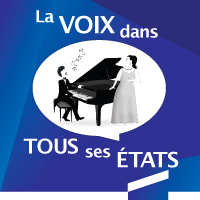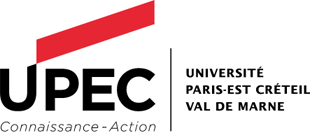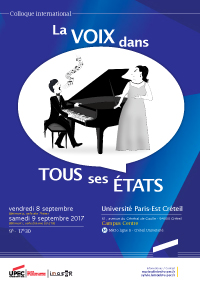- Télécharger en PDF
-
Partager cette page
- Télécharger en PDF
Vous êtes ici :
- Accueil FR ›
- Actualités
- Recherche,
- International,
- Culture scientifique et humanités,
Colloque international "La voix dans tous ses états"
Publié le 30 août 2017
Colloque international co-organisé par Sylvie Le Moël et Marie Olivier, enseignants-chercheurs à l'UPEC et membres d'IMAGER.

Date(s)
du 8 septembre 2017 au 9 septembre 2017
Lieu(x)
Université Paris-Est Créteil
Campus Centre de Créteil
Bâtiment P - salle des Thèses
Bâtiment I - salle Érasme (i3-218)
61, avenue du Général de Gaulle
94000 Créteil
Métro : Créteil Université (ligne 8)
> plan d'accès
Campus Centre de Créteil
Bâtiment P - salle des Thèses
Bâtiment I - salle Érasme (i3-218)
61, avenue du Général de Gaulle
94000 Créteil
Métro : Créteil Université (ligne 8)
> plan d'accès
Présentation
> Télécharger le programme
***
In his course on the Neutral at the Collège de France in 1977-1978, Roland Barthes explained that voice is “a false good subject, an object that resists: sparks off adjectives (soft, startling, white, neutral, etc., voice) but nothing more.” Voice is often understood in the paradigm of life and death: Plato’s Phaedrus notably opposes viva voce to writing, writing being on the side of death as immortality. Speaking viva voce, bringing a voice to life, isn’t this the primary mission of a poem, involving as it does a written and an oral dimension? Is a poem written to be spoken or declared at all times, like Walt Whitman’s oral and even operatic poetry? Whitman’s poetics are indeed deeply related to performance, just as a play is written to be played on stage. Is voice a chiasmus, a crux between the outside, alterity and oneself, one’s own musical body, what Danielle Cohen-Levinas referred to as “needing an incarnation other than itself”? For the musicologist, a “voice is the emanation of a repressed body. Such is the project of music in the Western civilization from the 17th century to the dawn of the 20ieth century.” According to Cohen-Levinas, it is endowed with the ability to turn the body away. One hears this diversion of the body in voices from the 18th century up to the beginning of the 20ieth century, or in a much more radical way, in Wagner’s project, for instance, where the body becomes indifferent, a mere corporal envelope. On the other hand, as Violaine Anger explains, as polysemic as the word voice may be, it remains the seat of unification: “if there is only one word [voice], that is because it marks the presence of a subject. Less an individual—which is a biologic notion— than a subject, however torn and unsure of its being and identity as it may be.” From the frantic voice of the lyric subject during the Romantic period to the collective voice drowned in the sea of modernity, in Idée de la voix, Claude Jamain sees and analyzes voice as having always been an entity to be sought and questioned.
This international symposium proposes to interrogate the textuality of voice under all its forms and shapes. It will be the occasion to listen to the voices haunting theater and opera stages, those at work in literature but also on the radio and in films. The symposium will focus on the chiasmus between voice and scription, on their corporeity as well as their spectrality. We will question how voices create meaning and how they overflow it, using a diachronic, translinguistic and transdisciplinary approach.
Organisation
- Sylvie Le Moël, professeur de littérature allemande à l'UPEC et membre d'IMAGER
- Marie Olivier, maître de conférences en littérature anglo-américaine à l'UPEC et membre d'IMAGER
Dans son Cours sur le Neutre au Collège de France,
Roland Barthes explique que la voix est "un faux bon sujet",
« un objet qui résiste, qui suscite des adjectifs (voix douce, prenante, blanche, neutre, etc.) mais rien de plus ».
La voix est souvent entendue dans le paradigme de la vie
et de la mort : le Phèdre de Platon, notamment, oppose
la parole vive à l’écriture, elle, du côté de la mort car du côté
de l’immortalité. Parler de vive voix, faire vivre la voix,
ne serait-ce pas la mission primitive du poème, qui engage dans ses vers, à la fois écriture et oralité ? Un poème est-il toujours fait pour être dit, déclamé, à l’image des vers d’un Walt Whitman, dont le caractère opératique est radicalement lié à la performance, de la même façon qu’une pièce de théâtre est écrite pour être jouée
sur scène, viva voce ?
La voix serait-elle ce nœud chiasmatique entre l’ailleurs, l’altérité et soi-même,
son corps propre et musical, celui-là qui, selon Danielle Cohen-Levinas, « a besoin
d’une incarnation autre que lui-même » ? Pour la musicologue, « la voix [est l’]émanation
d’un corps que l’on refoule : tel est le projet de la musique occidentale du XVIIe jusqu’à l’aube du XXe siècle ». D’un côté, la voix aurait donc le pouvoir de détourner le corps, ce que l’on peut entendre dans les voix du XVIIIe jusqu’au début du XXe siècle, ou de façon radicale, dans le projet wagnérien par exemple où le corps devient indifférent, une simple enveloppe charnelle. Cette dissociation radicale à l’opéra entre corps et voix est au fondement même
de l’écriture musicale occidentale, même si, d’un autre côté, comme Violaine Anger l’explique, la voix peut également être perçue comme unifiante. Entre voix éperdue de l’individu
dans la période romantique, et voix collective perdue dans la modernité, telle que
Claude Jamain l’explore dans Idée de la voix, la voix demeure une entité à toujours chercher et interroger.
Ce colloque international se propose d’interroger la textualité de la voix dans tous ses états en se mettant à l’écoute de toutes les voix qui hantent scènes de théâtre et d’opéra,
celles à l’œuvre dans la littérature, à la radio et au cinéma. Il s’intéressera au chiasme
entre voix et scription, et se donne pour but d’écouter les voix dans leur corporéité
mais aussi d’entendre leur spectralité, de prêter l’oreille à tous leurs débords et projets
de signification dans une approche à la fois diachronique, translinguistique et transdisciplinaire.
Roland Barthes explique que la voix est "un faux bon sujet",
« un objet qui résiste, qui suscite des adjectifs (voix douce, prenante, blanche, neutre, etc.) mais rien de plus ».
La voix est souvent entendue dans le paradigme de la vie
et de la mort : le Phèdre de Platon, notamment, oppose
la parole vive à l’écriture, elle, du côté de la mort car du côté
de l’immortalité. Parler de vive voix, faire vivre la voix,
ne serait-ce pas la mission primitive du poème, qui engage dans ses vers, à la fois écriture et oralité ? Un poème est-il toujours fait pour être dit, déclamé, à l’image des vers d’un Walt Whitman, dont le caractère opératique est radicalement lié à la performance, de la même façon qu’une pièce de théâtre est écrite pour être jouée
sur scène, viva voce ?
La voix serait-elle ce nœud chiasmatique entre l’ailleurs, l’altérité et soi-même,
son corps propre et musical, celui-là qui, selon Danielle Cohen-Levinas, « a besoin
d’une incarnation autre que lui-même » ? Pour la musicologue, « la voix [est l’]émanation
d’un corps que l’on refoule : tel est le projet de la musique occidentale du XVIIe jusqu’à l’aube du XXe siècle ». D’un côté, la voix aurait donc le pouvoir de détourner le corps, ce que l’on peut entendre dans les voix du XVIIIe jusqu’au début du XXe siècle, ou de façon radicale, dans le projet wagnérien par exemple où le corps devient indifférent, une simple enveloppe charnelle. Cette dissociation radicale à l’opéra entre corps et voix est au fondement même
de l’écriture musicale occidentale, même si, d’un autre côté, comme Violaine Anger l’explique, la voix peut également être perçue comme unifiante. Entre voix éperdue de l’individu
dans la période romantique, et voix collective perdue dans la modernité, telle que
Claude Jamain l’explore dans Idée de la voix, la voix demeure une entité à toujours chercher et interroger.
Ce colloque international se propose d’interroger la textualité de la voix dans tous ses états en se mettant à l’écoute de toutes les voix qui hantent scènes de théâtre et d’opéra,
celles à l’œuvre dans la littérature, à la radio et au cinéma. Il s’intéressera au chiasme
entre voix et scription, et se donne pour but d’écouter les voix dans leur corporéité
mais aussi d’entendre leur spectralité, de prêter l’oreille à tous leurs débords et projets
de signification dans une approche à la fois diachronique, translinguistique et transdisciplinaire.
> Télécharger le programme
***
In his course on the Neutral at the Collège de France in 1977-1978, Roland Barthes explained that voice is “a false good subject, an object that resists: sparks off adjectives (soft, startling, white, neutral, etc., voice) but nothing more.” Voice is often understood in the paradigm of life and death: Plato’s Phaedrus notably opposes viva voce to writing, writing being on the side of death as immortality. Speaking viva voce, bringing a voice to life, isn’t this the primary mission of a poem, involving as it does a written and an oral dimension? Is a poem written to be spoken or declared at all times, like Walt Whitman’s oral and even operatic poetry? Whitman’s poetics are indeed deeply related to performance, just as a play is written to be played on stage. Is voice a chiasmus, a crux between the outside, alterity and oneself, one’s own musical body, what Danielle Cohen-Levinas referred to as “needing an incarnation other than itself”? For the musicologist, a “voice is the emanation of a repressed body. Such is the project of music in the Western civilization from the 17th century to the dawn of the 20ieth century.” According to Cohen-Levinas, it is endowed with the ability to turn the body away. One hears this diversion of the body in voices from the 18th century up to the beginning of the 20ieth century, or in a much more radical way, in Wagner’s project, for instance, where the body becomes indifferent, a mere corporal envelope. On the other hand, as Violaine Anger explains, as polysemic as the word voice may be, it remains the seat of unification: “if there is only one word [voice], that is because it marks the presence of a subject. Less an individual—which is a biologic notion— than a subject, however torn and unsure of its being and identity as it may be.” From the frantic voice of the lyric subject during the Romantic period to the collective voice drowned in the sea of modernity, in Idée de la voix, Claude Jamain sees and analyzes voice as having always been an entity to be sought and questioned.
This international symposium proposes to interrogate the textuality of voice under all its forms and shapes. It will be the occasion to listen to the voices haunting theater and opera stages, those at work in literature but also on the radio and in films. The symposium will focus on the chiasmus between voice and scription, on their corporeity as well as their spectrality. We will question how voices create meaning and how they overflow it, using a diachronic, translinguistic and transdisciplinary approach.
Organisation
- Sylvie Le Moël, professeur de littérature allemande à l'UPEC et membre d'IMAGER
- Marie Olivier, maître de conférences en littérature anglo-américaine à l'UPEC et membre d'IMAGER
Contact :
- Télécharger en PDF
-
Partager cette page
- Télécharger en PDF


